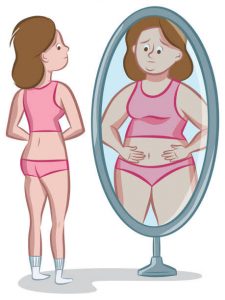As I bounded into the lecture hall, I could feel a thousand-and-one icy glares pierce through my soul. I felt a chill run down my spine; it felt like everyone was scrutinizing me, so I averted my eyes and kept my head down.
“You there, ‘Doctor African time’! Have you no manners?” the lecturer bawled.
I froze in my tracks, terrified. He wanted to know why I was late for the 07:30 class, again.
But, how could I tell him I had spent 40 minutes in the bathroom, ensuring that I washed off every trace of the previous day from my body, that I scrubbed every hideous inch of flesh I had? How could I justify the amount of time it took to fill the space between my breasts and the oversized bra I had on, with layers of fabric? Would he understand that I’d rather die than step outside without my ‘waist trainer’ concealing the true size of my abdomen?
Many of us would be unable to relate to the scenario above, as we do not let our imperfections constitute a hindrance to our day-to-day activities. However, there are some of us who face a similar struggle every day; a struggle to accept or come to terms with our physical appearance.
Such individuals may suffer from a condition known as Body Dysmorphic Disorder (BDD) or simply Body Dysmorphia.
What is BDD?
BDD is a condition that involves an obsession over a flaw in appearance. This flaw could either be real (usually minor but its severity exaggerated by the sufferer) or imagined.
People with BDD usually spend long periods of time in front of mirrors scrutinizing their appearance or waste time grooming themselves. In severe cases, one might feel so ashamed, so conscious of his/her appearance that they’d tend to avoid social contact, fall into depression, experience severe spates of anxiety and even contemplate suicide.
There are a wide range of factors which could predispose one to BDD. For many, teasing/stigma over facial and/or body appearance during their formative years is a strong causative. Other possible causatives are genetic predisposition; sexual trauma and even emotional trauma (imagine a bad breakup where your partner leaves you for someone more attractive).
Body Dysmorphia can be debilitating, and can last for a very long time.
This raises the question, “Is all hope lost for a BDD sufferer??”
What do you think?
Written by Ovie O. Jewel, Delta State University, Abraka, NIGERIA.



Of course hope isn’t lost. We just have to love ourselves and be our own biggest fan. Cheer yourself up even when others look down on you. The world doesn’t revolve around your body shape or appearance.
This is a very good right up, most people are subjects of body shaming but all I can say is you have to love yourself before others love you…
One thing I have to realise is that, when you accept who you are and we are confident about it, people then, tends to see less of our flaws…
Hmmm…a good number of people seem to suffer from this… And this had led some to take some unwise steps just to fit in… Never you look down on yourself… Don’t feel inferior to anyone.. You’re the best and no one can be like you… You gat to put worth on yourself.. God created you in a marvelous.. See yourself in his image… Hope isn’t lost dear… Put on the smile and people will love you more than u expect.
Well before..I used to care about being thin having slender legs and never letting a pimple out on my face why?
Because most people think being confident and beautiful is in all of these but it really isn’t
Loving yourself will open your eyes to see people who love you the way you are and trust me lots of people love you for how you are so why focus on people who don’t and starve yourself or wear things that make you feel self conscious or uncomfortable…kudos to the writer you really explained what people do and they aren’t suppose to focus on